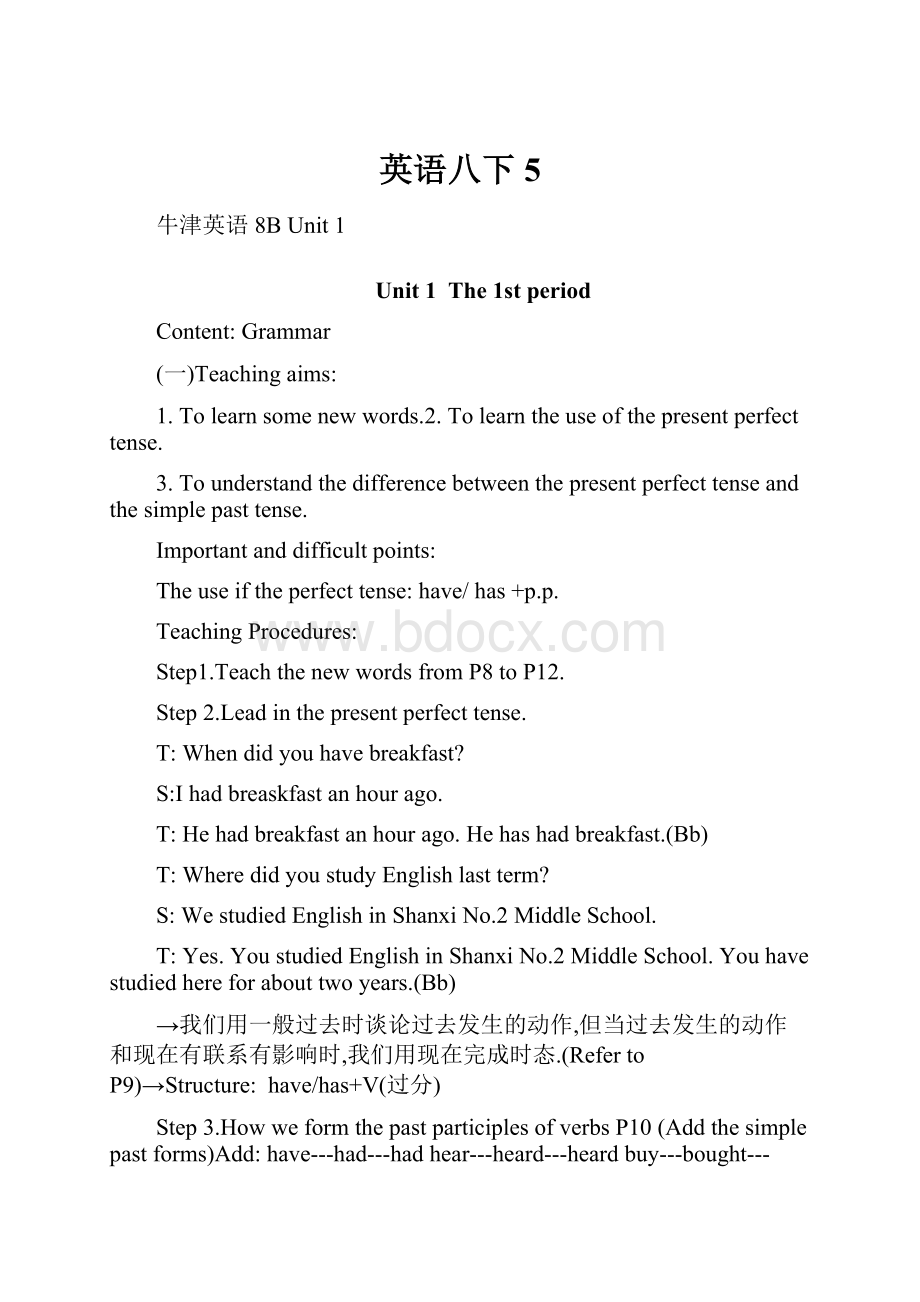英语八下5.docx
《英语八下5.docx》由会员分享,可在线阅读,更多相关《英语八下5.docx(18页珍藏版)》请在冰豆网上搜索。

英语八下5
牛津英语8B Unit 1
Unit1 The1stperiod
Content:
Grammar
(一)Teachingaims:
1.Tolearnsomenewwords.2.Tolearntheuseofthepresentperfecttense.
3.Tounderstandthedifferencebetweenthepresentperfecttenseandthesimplepasttense.
Importantanddifficultpoints:
Theuseiftheperfecttense:
have/has+p.p.
TeachingProcedures:
Step1.TeachthenewwordsfromP8toP12.
Step2.Leadinthepresentperfecttense.
T:
Whendidyouhavebreakfast?
S:
Ihadbreaskfastanhourago.
T:
Hehadbreakfastanhourago.Hehashadbreakfast.(Bb)
T:
WheredidyoustudyEnglishlastterm?
S:
WestudiedEnglishinShanxiNo.2MiddleSchool.
T:
Yes.YoustudiedEnglishinShanxiNo.2MiddleSchool.Youhavestudiedhereforabouttwoyears.(Bb)
→我们用一般过去时谈论过去发生的动作,但当过去发生的动作和现在有联系有影响时,我们用现在完成时态.(RefertoP9)→Structure:
have/has+V(过分)
Step3.HowweformthepastparticiplesofverbsP10(Addthesimplepastforms)Add:
have---had---hadhear---heard---heardbuy---bought---boughtgo---went---gonedo---did----doneeat---ate---eatenforget---forgot---forgottencut---cut---cutread---read---read
Step4.Explaintheuseofthepresentperfecttense.
(一)基本用法:
1.到现在为止这段时间已发生的情况.动作从过去延续到现在.
eg.Shehasbeenillforthreedays.(She’sbeen…)
Wehavelearned2,000Englishwords.(We’ve…)
2.某个动作虽是过去发生,但其后果和影响及于现在.eg.Thanksyou.I’vehadmysupper.(现在用不着吃)Tomhasseenthefilm.(对这部电影有所了解)
(二)时间状语:
already,yet(否,疑),since,ever,never,just,before(句尾),for+时间段,recently
eg.
Shehasalreadyfinishedherwork.
Ihaveeverheardaboutit.
Step5.Changetheabovesentencepatternstogeneralquestions,negativesentencesandquestiontheunderlinedparts.
Step6.MakesentencesP10A1
Step7.Comparethedifferencebetweenthepresentperfecttenseandthesimplepasttense.
现在完成时的特点是某一动作发生与现在有联系,一般过去时则单纯谈过去发生的某一动作,不涉及对现在的影响.eg.Simonhaslosthiswatch./Simonlosthiswatch.
Haveyouboughtapen?
/Whendidyoubuythepen?
Whatdidyouhaveforlunch?
/Haveyouhadlunch?
etc注:
句中有表示过去的时间状语如yesterday,lastweek,…agoetc,不能用现完.
Step8.ChattimeP11,A2
Step9.Assignment
Unit1The2ndperiod
Content:
Grammar
(三)Teachingaims:
1.Tolearnsomenewwords.2.Tolearntheuseofthepresentperfecttense.
3.Tounderstandthedifferencebetween“since”and“for”
Importantanddifficultpoints:
Thedifferences:
havebeento&havegoneto
Since&for…
TeachingProcedures:
Step1.DictatethenewwordsfromP8toP12
Step2.TeachthenewwordsfromP1toP7.
Step3.Checkthehomework.
Step4.Reviewthepresentperfecttense.
→Structure:
have/has+V(过去分词)Pastparticiple:
规则动词的过去分词与过去式相同。
Addsomeirregularverbs.teach---taught---taughtbring---brought---broughtget—got—gotknow--knew—knowngrow—grew--grown find--found—foundhold—held—heldshow—showed--shownkeep---kept---keptleave---left---leftlose---lost---lostrun---ran---runswim---swam—swum drive—drove--drivenbegin—began--begunStep5.Review时间状语already/yet,never/ever的用法。
Step6.Explaintheuseofsomewords.
(1).for和since的区别。
for和表示一段时间的词组连用。
eg.forsixhours/ninedays/twoweeks/thirtyyears
since和表示过去某一时刻的词或词组连用。
eg.sincenineo’clockthismorning/lastsummer/threeweeksago/September
since还可以引导时间状语从句,表示“自从…..以来”。
eg.自从他出生以来,他就住在这儿。
Hehaslivedheresincehewasborn. 自从我离开学校,我给他写过两次信。
IhavewrittentohimtwicesinceIleftschool.Wehavebeenfriendsforfiveyears.(1.用since改写句子2.划线提问)Wehavebeenfriendssince2000/fiveyearsago.(+时间点)Ihaveknownhimfortwomonths.(同上)
(2).just的用法just作“刚刚”解时,多和现在完成时连用。
eg.Ihavejustfinishedlunch.我刚吃过午饭。
Thetwovisitorshavejustarrived.两位来访者刚刚到达。
justnow“刚才”,动词只能用过去时态。
Theygaveittomejustnow.他们刚才将它给了我。
(3).havegoneto去了(没回来)havebeento去过,到过(已回来)
eg.HehasbeentoBeijing.他到过北京。
(现在他不在北京)HehasgonetoBeijing.他上北京去了。
(现在他不在这里)Wherehaveyou ?
Ihave tothepark.Whereishe?
Hehas tothelibrary.Step7.DoexercisesonP13.
Step8.Assignment
Unit1The3rdperiod
Content:
Grammar
(三)Teachingaims:
1.Tolearnsomenewwords.2.Tolearntheuseofthepresentperfecttense.
Importantanddifficultpoints:
短暂性动词(瞬间性动词)由于动作不能延续,故不能与表示一段时间的状语for…或since…连用。
常见的短暂性动词有:
go,come,borrow,open,close,stop,join,marry,die,become,arrive,reach,begin,start,leave,receive,buy,put,lose,lend,find,finish等。
如果表达上述短暂性动词“继续多长时间”的概念,则需要改用与之相应的表示状态的系表结构,这种系表结构多为be+形容词(副词、介词短语等)构成
TeachingProcedures:
Step1.DictatethenewwordsfromP1toP7
Step2.TeachthenewwordsfromP13toP19.
Step3.Checkthehomework.
Step4.Addsomeirregularverbs.
become—became---becomechoose—chose—chosencost—cost—costdrink—drank—drunkfeel—felt—feltgive—gave—givengrow—grew—grownhurt---hurt—hurtlend---lent---lentpay---paid---paidmeet---met---met
Step5.Explainthegrammar.
短暂性动词(瞬间性动词)由于动作不能延续,故不能与表示一段时间的状语for…或since…连用。
常见的短暂性动词有:
go,come,borrow,open,close,stop,join,marry,die,become,arrive,reach,begin,start,leave,receive,buy,put,lose,lend,find,finish等。
如果表达上述短暂性动词“继续多长时间”的概念,则需要改用与之相应的表示状态的系表结构,这种系表结构多为be+形容词(副词、介词短语等)构成,试比较:
误:
Hehascomehereforsevenyears.正:
Hehasbeenhereforsevenyears.Hecameheresevenyearsago.
误:
Thisfactoryhasopenedforseveralyears.正:
Thisfactoryhasbeenopenforseveralyears.(open是形容词,表示“开”的状态。
)Thisfactoryopenedseveralyearsago.(close→beclosed用法同上)
类似的词还有:
die→bedead
误:
Hisfatherhasdiedfortwomonths.正:
Hisfatherhasbeendeadfortwomonths/sincetwomonthsago. Hisfatherdiedtwomonthsago.
buy→have
误:
Samhasboughttheknifeforaweek.正:
Samhashadtheknifeforaweek/sinceaweekago.Samboughttheknifeaweekago.
getup→beup
误:
XiaoMinghasgotupforanhour.正:
XiaoMinghasbeenupforanhour.XiaoMinggotupanhourago.
leave→beawayfrom
误:
Shehasleftherefortwoyears.正:
Shehasbeenawayfromherefortwoyears.Sheleftheretwoyearsago.
borrow→keep误:
Tomhasborrowedthebookfortwodays.正:
Tomhaskeptthebookfortwodays. Tomborrowedthebookthedaybeforeyesterday.
join→bein+组织/bea…..成员
误:
MybrotherhasjoinedtheLeague/army/Partyfor10years.正:
MybrotherhasbeenintheLeague/army/Partyfor10years/since1995.或MybrotherhasbeenaLeaguemember/soldier/Partymember for10years/since1995.MybrotherjoinedtheLeague/army/Partyin1995.
start/begin→beon
误:
Thefilmhasbegunfortenminutes.正:
Thefilmhasbeenonfortenminutes.Thefilmbegantenminutesago.
comeback→beback
误:
Hehascomebackforthreedays.正:
Hehasbeenbackforthreedays.Hecamebackthreedaysago.
marry→bemarried
误:
Theyhavemarriedfor15years.正:
Theyhavebeenmarriedfor15years.Theygotmarried15yearsago.
Step6.Assignment
Unit1the4thperiod
Content:
Comicstrip&Welcometotheunit
Teachingaims:
1Tointroducetheconceptofsituationsthatstartedinthepastandarecontinuinginthepresent
2Toinintroducethegrammaticalconceptofthepresentperfecttensebyfocusingonatimelineandorderinginformationchronologically.
Teachingprocedures:
Step1:
Dictatenewwordsfrom“own”to“check”.
Step2:
Reviewthepresentperfecttense
(三)1)Translatesomesentences(oralpractice)
2)Correctmistakes
1Hehascomebackfortwohours
2Jimmywrotetomesincelastweek.
3Theygotmarriedsince10yearsago.
4Katehasjoinedtheleagueforthreeyears.
5WehavenevergonetoJapan.
6Howlonghashegonethere?
–SincelastFriday.
7Hehaswrittentwobookssincehehasworkedhere.
8HowlongdidyougototheUSA?
–Fiveyearsago.
Step3:
Warm-upactivities
1)Listentoashortdialogueandthinkaboutthefollowingquestions:
aWhatdidEddiedo?
Why?
bHowhasEddiechanged?
cHowhasHobochanged?
2)Listentothedialogueagainandtrytorepeatafterthetape
3)Readthedialoguetogetherandunderstandthemeaningofthedialogue.
4)ChangesomesentencepatternsaccordingtothedialogueEg:
I’veeatenit------Ihaven’teatenit.----- Haveyoueatenit?
Yes,Ihave/No,Ihaven’t.
5)Readitagainandtrytoreciteit.
Step4:
Welcometotheunit
ATransportatdifferenttimesWritethecorrectnamesunderthepictures.
BBacktothepastCompletethetimeline.
Makesentencesaccordingtothetimetable Eg:
Thepeaktramhasbeeninservicesince1890/for25years.Peoplebegantousethepeaktramin1890.
Step5Assignment
Unit1The5thperiod
Content:
Reading
(一)Teachingaims:
1Torecognizetypesofquestionsusedininterviews.
2Torecognizeextendedanswerstoopenquestions.
3Toinfergeneralmeaningfromtitleandcontext.
Importantanddifficultpoints:
Theunderstandingofthereading
Someusefulexpressions
Teachingprocedures:
Step1:
Dictatesomepastparticiples.
Step2:
Reviewthedialogue.
Step3:
Readthetextandfindtheanswerthefollowingquestions.
1)HowlonghasMrDongknowntheKowloonWalledCity?
2)Whendidtheymoveoutofit?
why?
3)Howhastheplacechanged?
4)Whatwasaproblembeforetheclosingoftheoldairport?
6)Howdoeshethinkaboutthelifenow?
Step4:
Dotheexerciseonpage6C1andcorrectthefalsestatement.
Step5:
Learnthefirsthalfofthetextandexplainsomeusefulexpressions.
1usedtodo/be;过去常常做-/是――eg:
Heusedtobeateacher.
Be/getusedtodoing—现在习惯于做――eg:
Heisusedtohavingnoodlesforbreakfast.
2infact.Ithoughtthisanswerwasright.infact,it’swrong.
3liveinablocklivetogether/thereliveonthefifthfloor
4getmarriedtosb=marrysb.与某人结婚。
Eg:
TomgotmarriedtoMarylastyear=TommarriedMarylastyear.Theygotmarriedlastyear.
5until直到――not---until直到――才――eg:
Hedidhishomeworkuntil7o’clockyesterdayevening.
Hedidn’tdohishomeworkuntil7o’clockyesterdayevening.
6actuallyadv. adj-actual真